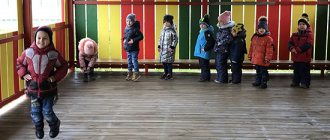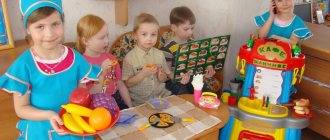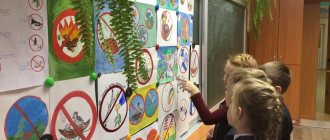The importance of role-playing games in the upbringing and development of a child
For a preschool child, play is a leading activity, a form of organizing life activity, and the main means of comprehensive development.
Starting from early preschool age, children show interest in play. However, they do not fully master gaming skills, and therefore children are very interested in playing with an adult. By middle preschool age, children already know how to play with each other; one of the most interesting games for them is role-playing game.
Definition 1
A role-playing game is a game that has a specific plot - a series of interconnected events and situations, and the roles that are distributed among its participants, and are the main core of the game.
Are you an expert in this subject area? We invite you to become the author of the Directory Working Conditions
Role-playing games are aimed at developing memory, thinking, imagination and personality in general in preschoolers.
The pedagogical value of a role-playing game lies in the fact that in addition to the relationships that are dictated to children by the plot of the game, other real and actual ones arise between them. During the game, children learn to interact with each other, understand how they relate to successes and failures, and learn to resolve conflict situations. The game helps the child overcome his timidity and embarrassment, and develops a variety of skills (work, play, communication, etc.), depending on the plot of the game.
Role-playing games teach children to independently establish relationships with the team and develop productive communication skills.
The game can be organized by a teacher who explains the plot to the children, assigns roles and manages the entire process of the game. The game can also be organized by children independently. When organizing the game independently, children themselves assign roles and follow the development of the plot. The game can be organized by children based on a fairy tale they read, a cartoon they watched, or the plot can be invented spontaneously (for example, a game of school, hospital, etc.).
Finished works on a similar topic
Course work Role-playing game, its role in the upbringing and development of a child 440 ₽ Abstract Role-playing game, its role in the child’s upbringing and development 280 ₽ Test work Role-playing game, its role in the child’s upbringing and development 240 ₽
Receive completed work or specialist advice on your educational project Find out the cost
In the process, role-playing games and joint play activities help children develop organization, responsibility, self-control and self-regulation skills, and consistency with the actions of other children. As the plot of the game develops, children acquire planning skills, creative imagination, initiative, activity, determination, etc.
Note 1
Thus, the role of role-playing games in the upbringing of a preschool child is very great, since it contributes to the comprehensive and complete development of the child’s personality and the formation of the necessary skills and abilities.
Types of games and their impact on a child’s mental development
While playing, the child not only has fun, but also develops. During this time, cognitive, personality and behavioral processes develop.
Children play most of the time. In preschool childhood, play goes through a significant development process.
Younger preschoolers play alone. The game is a manipulative and constructive object in nature. The game improves perception, memory, imagination, thinking and motor skills. Role-playing plays out the actions of adults as the child observes them. Parents and close friends serve as role models.
During the middle stage of preschool childhood, a child needs a peer to play with. Now the main focus of the game is simulating relationships between people. The themes of role-playing games are varied, certain rules are introduced, which the child strictly adheres to.
The focus of the games is varied: family games, where the heroes are mom, dad, grandma, grandpa and other relatives; educational games (nanny, kindergarten teacher); professional games (doctor, commander, pilot); fairy-tale games (goat, wolf, rabbit), etc. Both adults and children can participate in the game or substitute toys.
In older preschool age, thematic role-playing games are distinguished by a variety of themes, roles, game actions, and rules. Objects can be conditional, and the game becomes symbolic, that is, the cube can represent various objects: a car, people, animals - it all depends on the role assigned to it. At this age, some children begin to show organizational skills during play and become leaders in the game.
During the game, mental processes develop, especially volitional attention and memory. If the child is interested in the game, he involuntarily concentrates his attention on the objects contained in the game situation, on the content of the actions being played out and the plot. If he is distracted and does not perform his assigned role correctly, he may be excluded from the game. But since emotional encouragement and communication with peers are very important for a child, he must be attentive and remember certain game moments.
In the process of gaming activity, mental abilities develop. The child learns to act with a substitute object, that is, he gives it a new name and acts in accordance with this name. The appearance of a substitute object becomes the basis for the development of thinking. If at first the child learns to think about a real object with the help of substitute objects, then over time operations with substitute objects are reduced, and the child learns to act with real objects. There is a smooth transition to thinking in ideas.
In the process of role-playing games, imagination develops. From replacing some objects with others and the ability to take on different roles, the child moves on to identifying objects and acting with them in his imagination. For example, six-year-old Masha, looking at a photograph of a girl whose cheek is propped up with her finger and who is thoughtfully looking at a doll sitting next to a children's sewing machine, says: “The girl thinks as if her doll is sewing. From this statement we can judge the girl’s characteristic playing style.
Play also influences the development of a child's personality. In play, he/she reflects and models for himself the behavior and attitudes of significant adults, who at this moment act as models for his/her own behavior. Basic communication skills with peers are formed, feelings and volitional regulation of behavior develop.
Reflective thinking begins to develop. Reflection is a person’s ability to analyze his actions, actions and motives and correlate them with universal human values and with the actions, actions and motives of other people. The game promotes the development of reflection, since it makes it possible to control the execution of an action, which is part of the communication process. For example, when playing hospital, a child cries and suffers while playing the role of a patient. He gets satisfaction from this because he believes that he has fulfilled his role well.
Interest in drawing and design arises. At first, this interest manifests itself in the form of a game - the child, while drawing, acts out a certain action, for example, the animals he drew fight among themselves, catch up with each other, people go home, the wind blows apples hanging on trees, etc. Gradually the drawing is transferred to the result of the action, and a drawing appears.
In the process of gaming activity, educational activity arises. Elements of educational activities do not arise in the game; they are introduced by an adult. The child begins to learn through play, so he treats learning activities as role play and soon masters some learning activities.
Since the child pays special attention to role-playing play, let's look at it in a little more detail.
Role-playing game (game components, features, types of plots, stages of formation).
The outstanding Russian psychologist L. S. Vygotsky also noted that although the child creates imaginary situations during role-play, the feelings he experiences are very real. “Katya is a mother,” says the tiny girl, and, trying on a new role, she plunges into an imaginary world. And, regardless of whether her “daughter” was bought in an expensive toy store or sewn by a caring grandmother from Katya’s old tights, the little mother does not just repeat after her elders the manipulations that are supposed to be performed on babies, but experiences a real feeling of maternal love for her “ baby."
As the game and game design become more complex, children's feelings become more conscious and complex. And fa both reveals the child’s experiences and shapes his feelings. When a child imitates the astronauts, he will convey his admiration for them and his dream of becoming the same. And at the same time, new feelings arise: responsibility for the assigned task, joy and pride when it is successfully completed. I.M. Sechenov gave a physiological justification for the importance of play for the formation of feelings; he proved that play experiences leave a deep imprint on the child’s consciousness. Repeated repetition of the actions of adults and imitation of their moral qualities influence the formation of the same qualities in the child.
From the above, we can conclude that the plot-role-playing game is a school of feelings, in which the emotional
baby's world.
4. During the course of role-playing games, the preschooler’s intelligence develops
.
The development of a plan in a role-playing game is associated with the general mental development of the child, with the formation of his interests. Preschool children develop an interest in various life events, in different types of adult work; they have favorite book characters whom they strive to imitate. As a result, the ideas of games become more persistent, sometimes taking over their imagination for a long time. Some games (in “sailors”, “pilots”, “cosmonauts”) continue for weeks, gradually developing. The emergence of a long-term perspective of the game speaks of a new, higher stage in the development of gaming creativity. In this case, there is no repetition of the same theme day after day, as happens with children, but a gradual development, enrichment of the planned plot. Thanks to this, children's thinking and imagination become purposeful. The child's prolonged stay in one role forces him to delve deeper into the meaning of what he portrays.
5. Role-playing games develop imagination and creativity
.
Planned, coordinated actions in long-term role-playing games are combined with improvisation. Children outline a general plan, a sequence of actions, and during the game new ideas and new images arise. So, during a multi-day “sea voyage”, first one or the other participant in the game came up with new interesting episodes: divers sank to the bottom of the sea and found treasures, in hot countries they caught lions and took them to the zoo, in Antarctica they fed polar bears. The development of gaming creativity is also reflected in how various life experiences are combined in the content of the game. Already at the end of the third and fourth years of children’s lives, one can observe that they combine different events in play, and sometimes they can include episodes from fairy tales that were shown to them in the puppet theater. For children of this age, vivid visual impressions are important. Later (in the fourth and fifth years of life), children incorporate new experiences into their old favorite games. Reflecting life in a game, repeating life impressions in different combinations - all this helps the formation of general ideas and makes it easier for the child to understand the connection between different phenomena of life.
Psychological aspects of role-playing games consultation on the topic
Consultation for teachers on the topic:
Psychological aspects of role-playing games
Teacher-psychologist: Galiullina E.M.
Naberezhnye Chelny – 2014
The whole life of a preschool child is permeated with play; this is the only way he is ready to open himself to the world and the world for himself. Game is one of the main forms of organizing the process of education, training and development in kindergarten.
In the process of role-playing play, the child’s spiritual and physical strength develops; his attention, memory, imagination, discipline, dexterity. In addition, play is a unique way of learning social experience, characteristic of preschool age. In the game, all aspects of the child’s personality are formed, significant changes occur in his psyche, preparing the transition to a new, higher stage of development. This explains the enormous educational potential of play, which psychologists consider a leading activity. Game is a multifaceted phenomenon; it can be considered as a special form of existence of all aspects of the life of a group without exception. Just as many shades appear with play in the pedagogical management of the educational process.
Nowadays, psychologists and educators are increasingly saying that interaction with preschool children should take place in a playful way. This comes from the fact that gaming activity has always been and remains leading for preschool children. Children successfully master the educational program through play activities, since play is a way of processing impressions and knowledge received from the surrounding world. It is in role-playing games that the child has a unique opportunity to realize himself as an active participant in the ongoing activity; in addition, the game clearly reveals the characteristics of the child’s thinking and imagination, his emotionality, activity, and developmental problems in communication.
By uniting in a role-playing game, children choose partners of their own free will, set the game rules themselves, monitor their implementation, and regulate relationships. But the most important thing is that in the game the child embodies his view, his idea, his attitude towards the event that he is acting out. It is not without reason that psychologists recommend that if a child has a problem in one or another social area (he is afraid of doctors, does not want to go to the hairdresser, kindergarten), it is necessary to play a situation with him.
Role-playing game is a creative game of preschool children in a developed form, representing an activity in which children take on the roles of adults and, in a generalized form, in specially created game conditions, reproduce the activities of adults and the relationships between them. The main component of a role-playing game is the plot; without it, there is no role-playing game itself. The plot is a child’s reflection of certain actions, events, relationships from the life and activities of those around him. And game actions (turning the steering wheel of a car, preparing dinner, teaching students to draw, etc.) are ways to implement the plot.
The plots of the games are varied. They are conventionally divided into:
- household (family games, kindergarten),
- production, reflecting the professional work of people (games in the hospital, store, etc.),
-social (games to celebrate the city’s birthday, to the library, school, etc.),
- fairy-tale (roles of fairy-tale characters, theatrical performances). Throughout the history of mankind, the plots of children's games change because they depend on the era, economic characteristics, cultural, geographical, and natural conditions. So in our time, the plots of games are adjusted to the heroes of our time.
As mentioned earlier, the games of children of primary preschool age differ from the games of older children. These differences are associated with the relative limitations of experience, features of the development of imagination, thinking, and speech. In early preschool age, initially only the external side of activity appears, with what and how a person acts (the object is important): “a person is an object.” Children can repeat the same actions for a long time (using the example of playing doctor): taking the temperature, giving medicine, putting on a heating pad, applying brilliant green, etc. Then, as the child understands a person’s attitude to his activity, gains experience in social communication, in games The relationships between people (“person - person”) begin to be reflected: how a patient comes to the doctor, how the doctor behaves, what he asks, etc. And the objects themselves are easily replaced (pencil - thermometer, cup - stethoscope, etc.) or are only mentally imagined ( “It’s like I’m wearing scuba gear and I’m sinking to the bottom of the ocean”).
The content of the role-playing game is embodied by the child through the role he takes on. For a child, a role is his playing position: he identifies himself with a character in the plot and acts in accordance with his ideas about this character. Every role contains its own rules of behavior, taken by the child from the surrounding life, borrowed from relationships in the adult world. So, the mother takes care of the children, prepares food for them, puts them to bed; The teacher speaks loudly and clearly, is strict and demands attention in her lessons. Submission of the child to the rules of role-playing behavior is the most important element of role-playing play. Deviation from the rules by anyone or those playing causes protests from the playing partners. That is, for preschoolers, a role is an example of how to act. Based on this sample, the child evaluates the behavior of the participants in the game, and then his own. The role forces the child to show discipline and devotion to duty, endurance and patience, courage and generosity. Collective role-playing game creates in children the experience of responsibility for a common cause and unites the children's team. Joint play activities help children develop the ability to control their actions and coordinate them with other children. Role-playing play is the first test of social forces and their first test, and therefore teachers need to create conditions for children’s play activities, taking into account the place and time of the day, maintain and update the play base according to age: toys, manuals, attributes, substitute items. We must also enrich the content of children's play using various methods and techniques such as: observations, excursions, meetings with people of different professions, reading fiction, stories about the work of adults, the use of illustrations, dramatization of literary works, ethical conversations, direct participation of the teacher in the game, suggestions, advice, explanations, questions aimed at suggesting to children the possible implementation of a plan, joint implementation of buildings with children, showing construction techniques, etc. After all, life is revealed to the child through the varied work of adults, and he himself begins to work.
Recommendations for educators
1. Teachers should try not to take up the time allocated for play with other activities.
2. Create a gaming environment in accordance with age characteristics, taking into account the level of development of children; the gaming environment should be dynamic. The attributes of the role-playing game should be located in a place easily accessible to children. Sometimes attributes are formed in a specially established order, and sometimes children are given the opportunity to create a playing environment on their own.
3. An effective method of guiding the games of children of primary preschool age is the direct participation of the teacher in the children’s play in the main roles, and initially it is recommended to use individual play with a given child, and at the end of the fourth year of life it is recommended to use the teacher’s play with a subgroup of children.
4. In guiding children, indirect leadership techniques occupy a large place, so as not to interfere with the child’s ability to play independently, because Only independent role-playing play contributes to the development of the child to the greatest extent.
5. Game management should be based on the results of observation of children’s independent role-playing play.
6. The teacher should put the child in the position of an “adult” as often as possible. This helps develop independence in children.
Recommendations for parents
1. Make sure that the child has as many different games and toys as possible, which must be consciously chosen and not randomly accumulated.
2. Agree in advance with your child the requirements for storing and cleaning toys. Consider how you can temporarily preserve children's buildings and structures. In the absence of space for a long display, “celebrate the result” - and only then put the toys away for storage.
3.Remember your childhood and tell your child about how you played by yourself and with your friends. If the child wishes, show children's games that you know.
4. Observe the child’s games at home and, if desired, tell the teachers about them; Ask what your child prefers to play in kindergarten.
5. Show respect for the child’s personality, take into account the gradual development of play activity and do not try to artificially speed it up.
6. Tactfully, unobtrusively, offer your child help in creating a play environment (“Perhaps you’ll need my pan to cook dinner? Would you like me to help you make a garage for your car?”, etc.). Take the child’s refusal for granted (“Of course, you know better. But if you need anything, I will be happy to help you”). Consider all subsequent requests from your child as a manifestation of trust and respect for your delicacy and tact.
7. Show initiative and express a sincere desire to participate in the game.
8. Having received the child’s consent to your participation in the game, take an interest in your role (“Who will I be?”) and accept it unconditionally and with gratitude.
9. If you do not understand the situation and the child’s wishes, ask him about the circumstances that are important for the development of the plot, related to the characteristics of the hero, his behavior, etc. (“What kind of fox will I be—good or evil?”).
When acting in a role, show initiative and independence, try to motivate the actions of the hero whose role you are playing. If difficulties arise, do not get lost, do not stop playing, but ask your child what you should do (“What should I do next?”).
Always agree with your baby! This gives him confidence in his abilities and generates initiative and creativity.
At the end of the game, express your satisfaction to your child and express the hope that next time he will invite you to participate in it.
Provide constant attention and respect to children's play.
Express your approval and admiration for the fact that children are independent and proactive in their games (“What a great fellow you are (clever)! How do you manage to come up with all this yourself?”).
10. Empathize with children’s feelings in games - be able to see the funny in what seems funny to them, be sad about what seems sad to them, etc.
11. Draw the child’s attention to pedagogically valuable and aesthetic games and toys.
An important means of forming relationships with peers is role-playing play. In a role-playing game, the ability to make a choice and correctly resolve a conflict situation is formed, which in turn contributes to the formation of moral motives of behavior.
Role-playing play promotes the formation of positive relationships between preschool children and their peers through systematic and indirect interaction between the teacher.
Thus, the successful implementation of gaming activities is possible with the skillful guidance of a teacher who is able to make role-playing games an exciting process.
LIST OF REFERENCES USED
- Boychenko N.A. “Plot role-playing games for preschoolers”, Kyiv “Radyanskaya school”, 2008.
- Bondarenko A.K. “Didactic games in kindergarten”, Moscow, “Prosveshchenie”, 2005.




